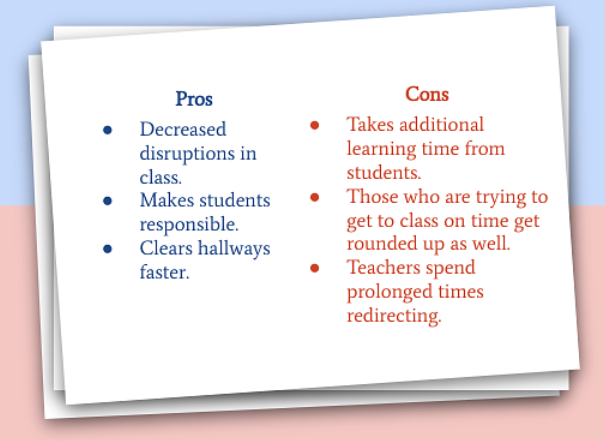
For the past few years, Malden High School has faced an issue of students disregarding or missing the bells informing them of class starting. The administration knew something needed to be done and developed a new policy.
Starting November 12, 2024, the new policy changed the lives of many students at Malden. The new tardy policy instructed teachers to lock their doors when the bell rings. The policy was introduced to limit cluttered hallways and reduce the number of tardy students in a class, hoping to bring them back on track. However, a difference in opinions swirls in the air as transitions continue to be made.

Naturally, with change comes obstacles and perspectives of those impacted, in our case, the staff members and students. Recommended by Superintendent Dr. Sippel, strong vocal comments, critiques, and praises on how the policy affects student lives this school year have arisen from teachers and students.
“I am having much fewer problems with students coming late to class. It’s much less disruptive so it’s easier to get class started and to get everyone moving from the same place rather than having a flow of late students,” commented Spanish teacher Elana Mayer.
For a quick refresher, three bells ring during transition time. The first bell ring marks the end of a class period, urging students to collect their materials and head on to their next class. The second bell—the warning bell—lets students know they have two minutes to make it to class. Finally, the last bell marks the beginning of the next class period. Once this bell rings, teachers shut and lock their doors.
“School is preparing you for work. The skills that you develop now, you will use in the near future, and if you’re not in your workstation, you’re not doing your work, you’re not going to be successful in your job,” shared Kristy Magras, grades 10-12 Holland Guidance Counselor. “These skills that you’re learning now are going to be important for your future.”
As a result of the policy, it can be observed that students are increasingly determined to get to class on time, avidly organizing their schedules and clearing the hallways before the bell rings. “The new tardy policy encourages students to get to class on time, which will essentially help us in the long run,” mentioned Ruby Neicth Forbes.”It helps me take more responsibility for myself. In life we are expected to be responsible and mindful…it starts now! Time is very valuable, you can never get back the three, five, or even ten minutes you may have missed in class.”

Despite the positive changes in Malden High’s environment, students bring light to factors affecting the time taken to transition leading to tardiness by a minute or two. The high school consists of three buildings, four houses, and five floors—including the Holland Basement—and approximately 2,000 students. As soon as the bell rings, 2,000 students have to navigate to their next class within five minutes posing difficulties when the respective class is on the other side of the building.
Additionally, some hallways, staircases, and bridges are more crowded than others causing a traffic jam. Multiple people have stated that depending on the day (blue or gold) and next class period, different locations in the building are populated. With the new tardy policy in place, students have become prone to pushing and shoving which poses a risk factor, specifically on the stairs.
“It’s an inconvenience to everyone involved—teachers and students. I get what this policy is trying to do and I understand the disruptions caused by students constantly entering a classroom while a teacher is proceeding with their lesson, but it wastes more time than a couple of minutes of tardiness,” expressed junior Rachel Lanza.
The major complaint from the student body is that those who are actively trying to get to class on time, but are late one to three minutes because of the hallway traffic, should be pardoned from the round-up.
“This policy is a great inconvenience for students and takes time from their learning… students who would’ve arrived to class at 8:00 a.m. now arrive 20 minutes later because of the redirection and signing-in process,” stated junior Nour Howard.
In agreement with Howard, junior Laura Onyejiaka explained, “It causes unnecessary anxiety and humiliates students when they are sent to class 15-20 minutes late.” Instead, Onyejiaka proposed “a personal approach to those who are constantly tardy, not a policy that affects students who are running one to five minutes late.”
From the other side of the door, World History teacher Marsha Healy shared, “The amount of staff it takes to escort students everywhere takes a lot of time…they are already very busy and this makes them extra busy… more monitors would speed up the process, but then again, it clashes with the time spent by teachers.”
The policy itself appears to look better than it works in practice. While there are beneficial factors, there is a push from faculty and students to find new methods of improving it.




